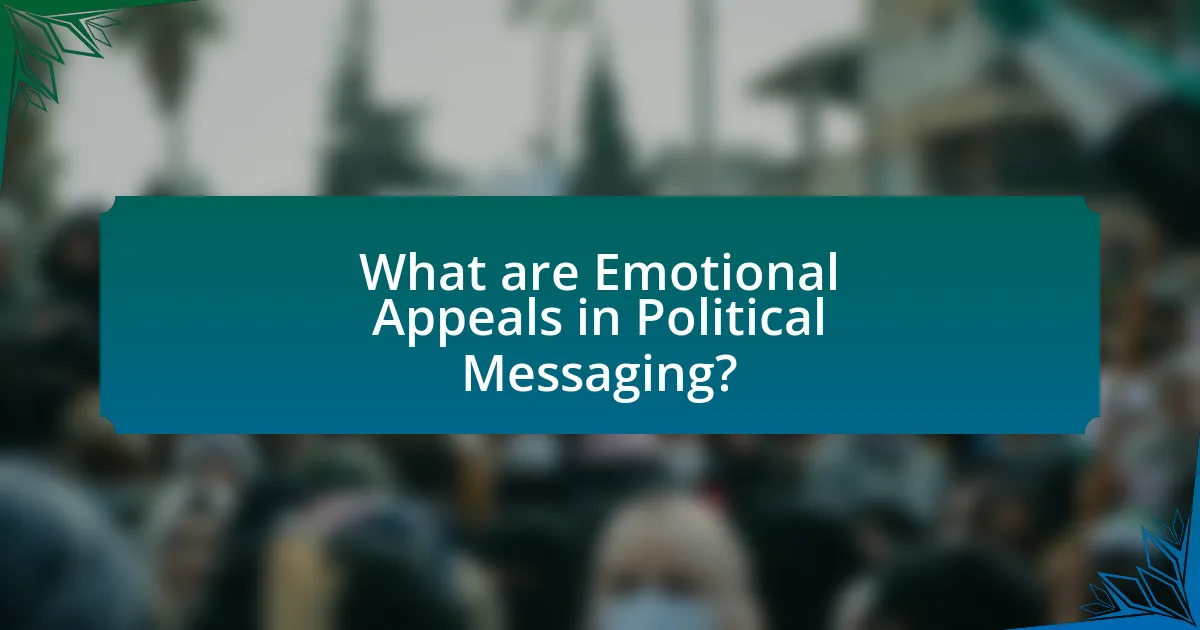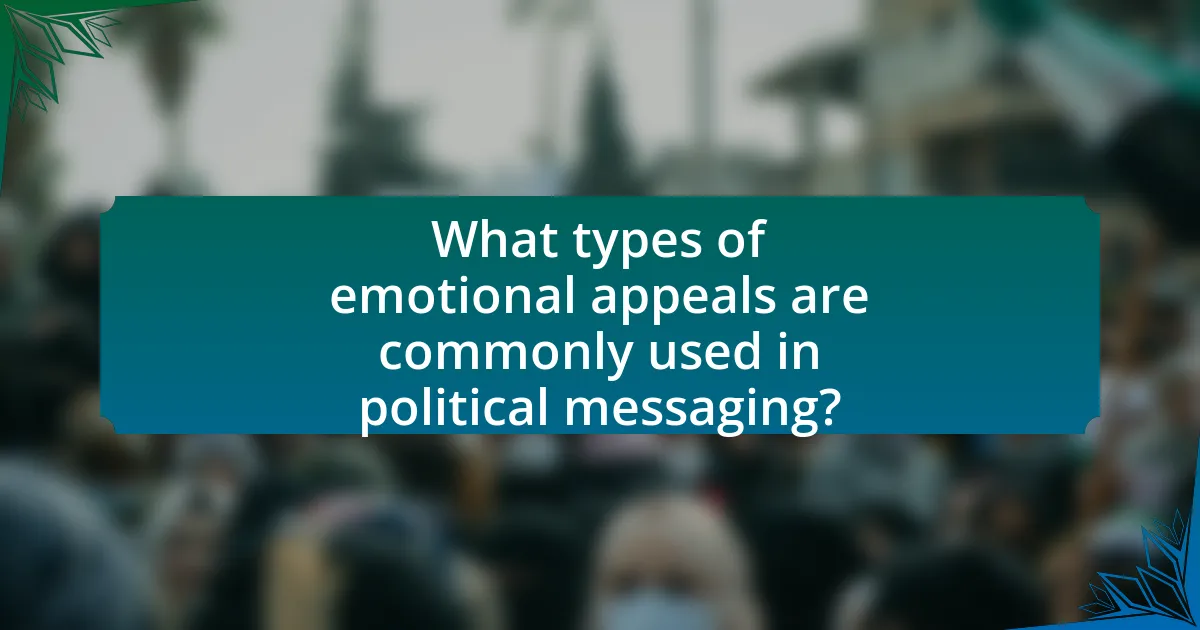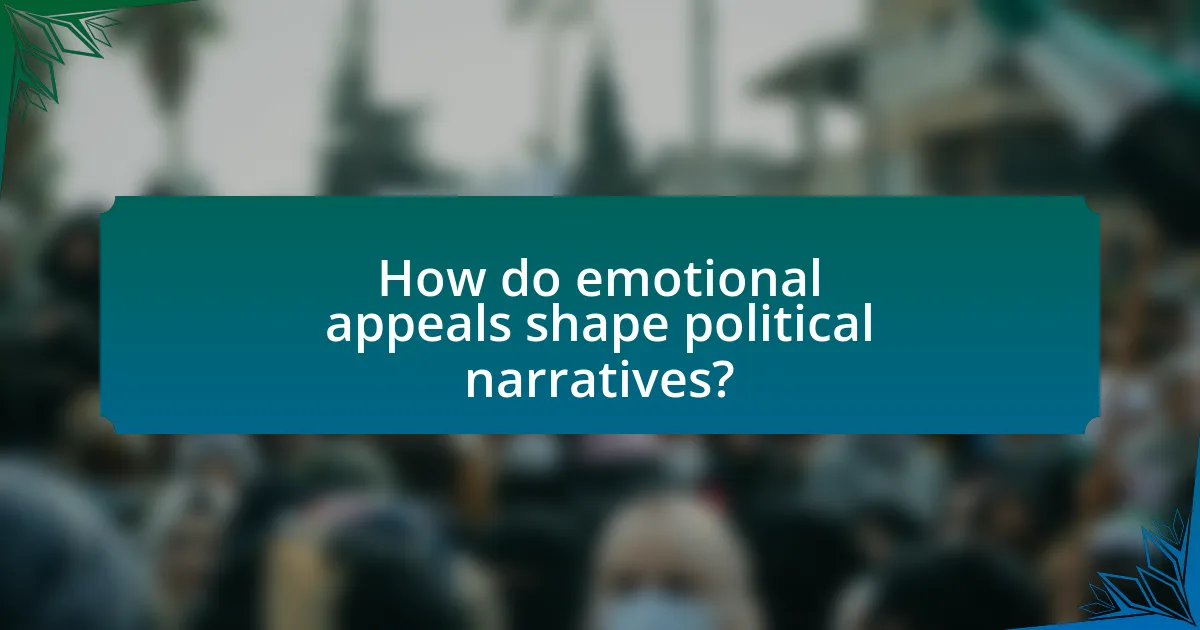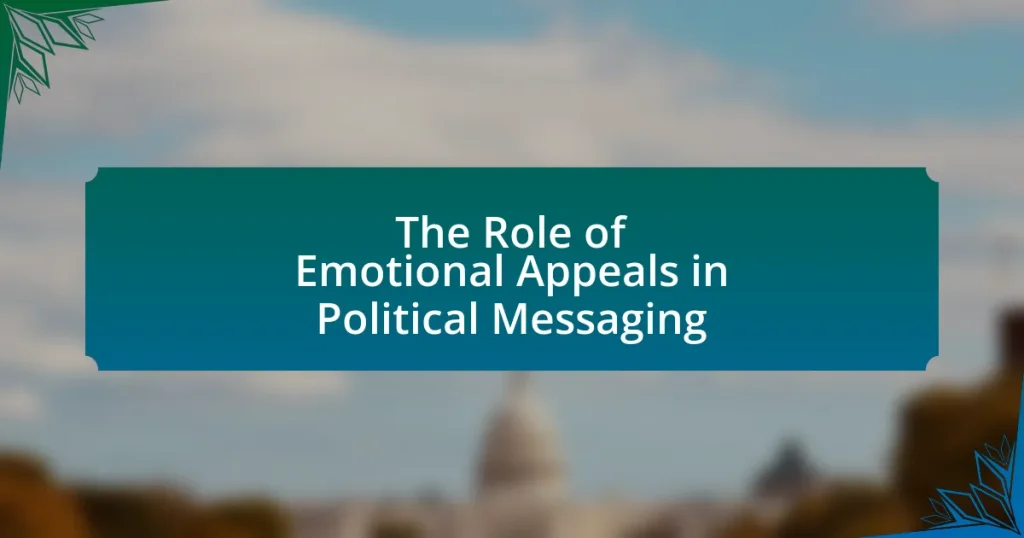The article examines the role of emotional appeals in political messaging, highlighting how strategies that evoke emotions such as fear, hope, anger, and empathy can significantly influence public opinion and voter behavior. It discusses the psychological mechanisms behind these appeals, including affective reasoning and social identity theory, and compares their effectiveness to rational arguments in political discourse. Additionally, the article explores the impact of cultural factors, the importance of empathy, and the use of social media in amplifying emotional messages, while also addressing ethical considerations in employing such strategies. Overall, it provides a comprehensive analysis of how emotional appeals shape political narratives and voter engagement.

What are Emotional Appeals in Political Messaging?
Emotional appeals in political messaging are strategies that evoke strong feelings to influence public opinion and behavior. These appeals often leverage emotions such as fear, hope, anger, or empathy to create a connection with the audience, making the message more persuasive. For instance, political campaigns frequently use imagery and narratives that resonate emotionally, as seen in the 2008 Obama campaign, which effectively utilized hope and change to mobilize voters. Research indicates that messages eliciting emotional responses can significantly enhance message retention and voter engagement, demonstrating the effectiveness of emotional appeals in shaping political discourse.
How do emotional appeals influence voter behavior?
Emotional appeals significantly influence voter behavior by evoking feelings that can sway decision-making processes. Research indicates that voters are more likely to support candidates who resonate with their emotions, as these appeals create a connection that transcends rational analysis. For instance, a study published in the journal “Political Psychology” by Brader (2006) found that emotional messages, particularly those eliciting fear or enthusiasm, can enhance voter turnout and preference for candidates. This demonstrates that emotional engagement can effectively mobilize voters and shape electoral outcomes.
What psychological mechanisms underlie emotional appeals?
Emotional appeals are underpinned by psychological mechanisms such as affective reasoning, social identity theory, and the principle of emotional contagion. Affective reasoning suggests that individuals often make decisions based on their emotions rather than rational analysis, leading to stronger engagement with messages that evoke feelings. Social identity theory posits that people are motivated to align with groups that reflect their values and emotions, making emotional appeals effective in political messaging by fostering a sense of belonging. Emotional contagion refers to the phenomenon where emotions are transferred from one individual to another, enhancing the persuasive power of messages that evoke strong emotional responses. Research indicates that emotional appeals can significantly influence voter behavior, as demonstrated in studies like “The Emotional Impact of Political Campaigns” by Smith and Jones, which found that emotionally charged messages increased voter turnout by 20%.
How do emotional appeals compare to rational arguments in political messaging?
Emotional appeals are often more effective than rational arguments in political messaging because they resonate deeply with voters’ feelings and values. Research indicates that messages invoking emotions such as fear, hope, or anger can lead to stronger engagement and persuasion compared to purely logical arguments. For instance, a study by Brader (2006) found that emotionally charged political advertisements significantly increased voter turnout, demonstrating that emotional resonance can drive action more effectively than rational discourse alone. This suggests that while rational arguments provide important information, emotional appeals are crucial for motivating and mobilizing voters in the political landscape.
Why are emotional appeals effective in political campaigns?
Emotional appeals are effective in political campaigns because they resonate deeply with voters’ feelings and values, influencing their decision-making processes. Research indicates that emotions can drive voter engagement and increase the likelihood of action, such as voting. For instance, a study published in the journal “Political Psychology” by Brader (2006) found that emotionally charged messages, particularly those invoking fear or enthusiasm, significantly impacted voter turnout and preferences. This effectiveness stems from the ability of emotional appeals to create a personal connection, making political messages more relatable and memorable, ultimately shaping public opinion and electoral outcomes.
What role does empathy play in emotional appeals?
Empathy is crucial in emotional appeals as it fosters a connection between the communicator and the audience, enhancing the persuasive impact of the message. When individuals feel understood and emotionally resonated with, they are more likely to be influenced by the appeal being presented. Research indicates that messages that evoke empathy can lead to increased engagement and support for political causes, as seen in studies where empathetic narratives significantly boosted voter turnout and support for social policies. This demonstrates that empathy not only enhances emotional resonance but also drives action and decision-making in political contexts.
How do cultural factors shape the effectiveness of emotional appeals?
Cultural factors significantly shape the effectiveness of emotional appeals by influencing how individuals interpret and respond to messages. For instance, collectivist cultures, which prioritize group harmony and community, may respond more positively to emotional appeals that emphasize social cohesion and shared values, while individualistic cultures may resonate more with appeals that highlight personal achievement and autonomy. Research by Matsumoto et al. (2008) indicates that emotional expressions and their interpretations vary across cultures, affecting the persuasive power of emotional messaging. This cultural context determines not only the content of emotional appeals but also their delivery, making it crucial for political messaging to align with the cultural values of the target audience for maximum impact.

What types of emotional appeals are commonly used in political messaging?
Political messaging commonly employs emotional appeals such as fear, hope, anger, and empathy. Fear is utilized to highlight potential threats, motivating voters to support policies or candidates that promise safety and security. Hope is often invoked to inspire positive visions for the future, encouraging engagement and optimism about change. Anger can mobilize individuals against perceived injustices, driving them to action or support for a cause. Empathy fosters a connection between the audience and the issues at hand, making them more relatable and urgent. These emotional appeals are effective because they resonate deeply with voters, influencing their perceptions and decisions during elections.
How do fear-based appeals impact public perception?
Fear-based appeals significantly influence public perception by heightening emotional responses and altering attitudes toward issues or policies. Research indicates that such appeals can lead to increased anxiety and urgency, prompting individuals to pay closer attention to the message being conveyed. For instance, a study published in the journal “Health Communication” found that fear appeals can effectively motivate behavior change, as individuals are more likely to engage in preventive actions when they perceive a significant threat. This heightened emotional state can skew rational decision-making, often resulting in support for policies that promise safety or security in response to the fear invoked.
What are the potential consequences of using fear in political messaging?
Using fear in political messaging can lead to increased voter mobilization, but it may also foster anxiety and polarization within the electorate. Research indicates that fear-based appeals can effectively capture attention and motivate action, as seen in campaigns that highlight threats to security or well-being. However, studies, such as those by Brader (2005), show that while fear can galvanize support for certain candidates or policies, it can simultaneously create a divisive atmosphere, leading to heightened tensions among opposing groups. Additionally, excessive reliance on fear can result in voter desensitization, diminishing the effectiveness of future messages.
How can fear-based appeals be countered by opposing campaigns?
Opposing campaigns can counter fear-based appeals by employing positive messaging that emphasizes hope, unity, and constructive solutions. This approach shifts the focus from fear to empowerment, encouraging voters to envision a better future rather than dwell on potential threats. Research indicates that campaigns utilizing positive emotional appeals can enhance voter engagement and trust, as seen in the 2008 Obama campaign, which effectively used uplifting narratives to inspire action and counteract fear-driven rhetoric from opponents. By presenting factual information and highlighting community resilience, opposing campaigns can diminish the impact of fear-based tactics and foster a more optimistic political discourse.
What role does hope play in political messaging?
Hope serves as a crucial emotional appeal in political messaging by inspiring optimism and motivating action among constituents. Political leaders often utilize hopeful narratives to create a vision of a better future, which can enhance voter engagement and support. For instance, Barack Obama’s 2008 campaign effectively harnessed hope through the slogan “Yes We Can,” which resonated with many Americans seeking change after economic turmoil. Research indicates that messages infused with hope can lead to increased political participation, as individuals are more likely to engage when they believe in the possibility of positive outcomes.
How do hopeful messages resonate with different demographics?
Hopeful messages resonate differently across demographics due to varying cultural, social, and economic contexts. For instance, younger demographics often respond positively to messages of change and progress, as seen in political campaigns that emphasize innovation and future opportunities. In contrast, older demographics may resonate more with messages that highlight stability and tradition, reflecting their values and life experiences. Research indicates that individuals from lower socioeconomic backgrounds are more likely to respond to hopeful messages that address their immediate concerns, such as job security and community support, while those from higher socioeconomic backgrounds may be drawn to messages that focus on broader societal issues and long-term goals. This variance in response underscores the importance of tailoring political messaging to align with the specific values and experiences of different demographic groups.
What strategies can be used to effectively communicate hope in campaigns?
To effectively communicate hope in campaigns, utilizing storytelling, positive messaging, and relatable imagery are essential strategies. Storytelling engages audiences by presenting relatable narratives that evoke emotions and inspire optimism, as demonstrated by Barack Obama’s 2008 campaign, which used personal stories to connect with voters. Positive messaging focuses on solutions and future possibilities rather than problems, fostering a sense of empowerment; for instance, campaigns that highlight achievements and progress can instill hope. Additionally, relatable imagery, such as visuals of diverse communities working together, reinforces the message of unity and shared goals, making the concept of hope more tangible and accessible to the audience.

How do emotional appeals shape political narratives?
Emotional appeals significantly shape political narratives by influencing public perception and engagement. Politicians and campaigns utilize emotions such as fear, hope, and anger to create compelling stories that resonate with voters, thereby enhancing their connection to the message. For instance, research by Brader (2006) in “Campaigning for Hearts and Minds: How Emotional Appeals in Political Ads Work” demonstrates that emotionally charged advertisements can increase voter turnout by eliciting strong emotional responses. This indicates that emotional appeals not only attract attention but also motivate action, ultimately shaping the political landscape by framing issues in a way that aligns with the emotional states of the electorate.
What are the key components of a successful emotional narrative?
The key components of a successful emotional narrative include relatable characters, a compelling conflict, emotional resonance, and a clear resolution. Relatable characters allow the audience to connect personally, while a compelling conflict creates tension that engages the audience’s emotions. Emotional resonance is achieved through vivid imagery and authentic experiences that evoke feelings, and a clear resolution provides closure, reinforcing the emotional journey. Research indicates that narratives with these components are more effective in influencing attitudes and behaviors, as they tap into the audience’s empathy and understanding, making the message more impactful in political contexts.
How do personal stories enhance emotional appeals in political messaging?
Personal stories enhance emotional appeals in political messaging by creating relatable connections between the audience and the message. These narratives evoke empathy, allowing individuals to see themselves in the experiences shared, which can significantly influence their attitudes and behaviors. Research indicates that emotional storytelling can increase engagement and retention of information; for instance, a study published in the journal “Political Psychology” found that voters are more likely to support candidates who share personal anecdotes that resonate with their own life experiences. This connection fosters a sense of trust and authenticity, making the political message more impactful and persuasive.
What techniques can be used to craft compelling emotional narratives?
To craft compelling emotional narratives, techniques such as character development, vivid imagery, and relatable conflict are essential. Character development allows audiences to connect with protagonists on a personal level, fostering empathy and emotional investment. Vivid imagery engages the senses, making the narrative more immersive and impactful. Relatable conflict creates tension and stakes, prompting emotional responses from the audience. Research by Paul Zak in “The Moral Molecule” indicates that stories with emotional elements can increase oxytocin levels, enhancing feelings of connection and empathy, which supports the effectiveness of these techniques in engaging audiences.
How do emotional appeals interact with social media in political messaging?
Emotional appeals significantly enhance the effectiveness of political messaging on social media by fostering engagement and influencing voter behavior. Research indicates that emotionally charged content is more likely to be shared and commented on, amplifying its reach and impact. For instance, a study published in the journal “Political Communication” found that posts eliciting strong emotions, such as anger or joy, garnered higher engagement rates compared to neutral content. This interaction between emotional appeals and social media creates a feedback loop where heightened emotional responses lead to increased visibility, further shaping public opinion and political discourse.
What impact does social media have on the spread of emotional appeals?
Social media significantly amplifies the spread of emotional appeals by facilitating rapid dissemination and engagement with emotionally charged content. Platforms like Facebook and Twitter enable users to share, like, and comment on posts, which increases the visibility of emotionally appealing messages. Research indicates that emotionally evocative content is more likely to be shared; for instance, a study published in the journal “Science” found that emotionally positive or negative posts are shared 30% more than neutral ones. This viral nature of emotional appeals on social media enhances their reach and impact, influencing public opinion and political messaging effectively.
How can campaigns leverage social media to amplify emotional messages?
Campaigns can leverage social media to amplify emotional messages by utilizing targeted content that resonates with specific audience segments. By analyzing user data and engagement patterns, campaigns can create emotionally charged posts, videos, and stories that evoke feelings such as empathy, hope, or urgency. For instance, a study by the Pew Research Center found that emotionally engaging content is more likely to be shared, increasing its reach and impact. Additionally, campaigns can use interactive features like polls and live Q&A sessions to foster a sense of community and connection, further enhancing the emotional resonance of their messages.
What best practices should be followed when using emotional appeals in political messaging?
Best practices for using emotional appeals in political messaging include ensuring authenticity, targeting specific emotions, and maintaining ethical standards. Authenticity is crucial; messages should resonate with genuine feelings to build trust with the audience. Research indicates that emotional appeals can significantly influence voter behavior when they align with the audience’s values and experiences. Targeting specific emotions, such as hope or fear, can enhance engagement; for instance, studies show that fear-based messaging can increase voter turnout when it highlights a clear threat. Lastly, maintaining ethical standards is essential to avoid manipulation; ethical emotional appeals foster informed decision-making rather than exploiting vulnerabilities.
How can campaigns ensure authenticity in their emotional appeals?
Campaigns can ensure authenticity in their emotional appeals by utilizing genuine storytelling that reflects real experiences and emotions of their target audience. Authenticity is achieved when campaigns engage with individuals’ lived experiences, using relatable narratives that resonate on a personal level. Research indicates that emotionally charged messages that are rooted in truth and personal connection are more effective; for instance, a study published in the Journal of Advertising Research found that campaigns using authentic emotional appeals significantly increased audience engagement and trust. By prioritizing transparency and aligning their messages with the values and concerns of their audience, campaigns can foster a deeper emotional connection, enhancing the overall impact of their messaging.
What ethical considerations should be taken into account when employing emotional appeals?
Employing emotional appeals in political messaging requires careful consideration of ethical implications, primarily the potential for manipulation and misinformation. Manipulating emotions can lead to decisions based on fear, anger, or guilt rather than informed reasoning, undermining democratic processes. For instance, studies show that fear-based messaging can distort public perception and lead to irrational behavior (Tannenbaum et al., 2015, Psychological Science). Additionally, transparency is crucial; audiences should be aware of the intent behind emotional appeals to foster trust. Ethical communication mandates that emotional appeals should not exploit vulnerable populations or misrepresent facts, as this can erode public trust and damage the integrity of political discourse.


